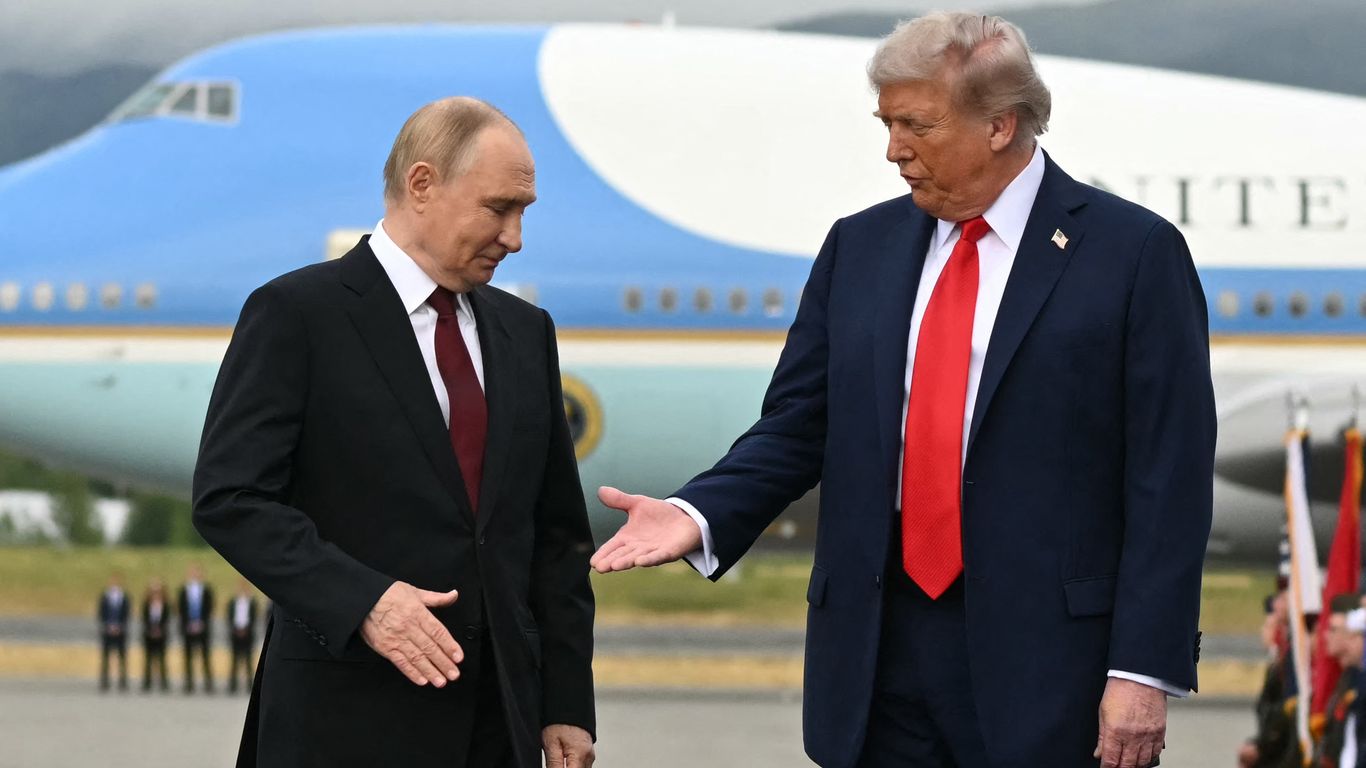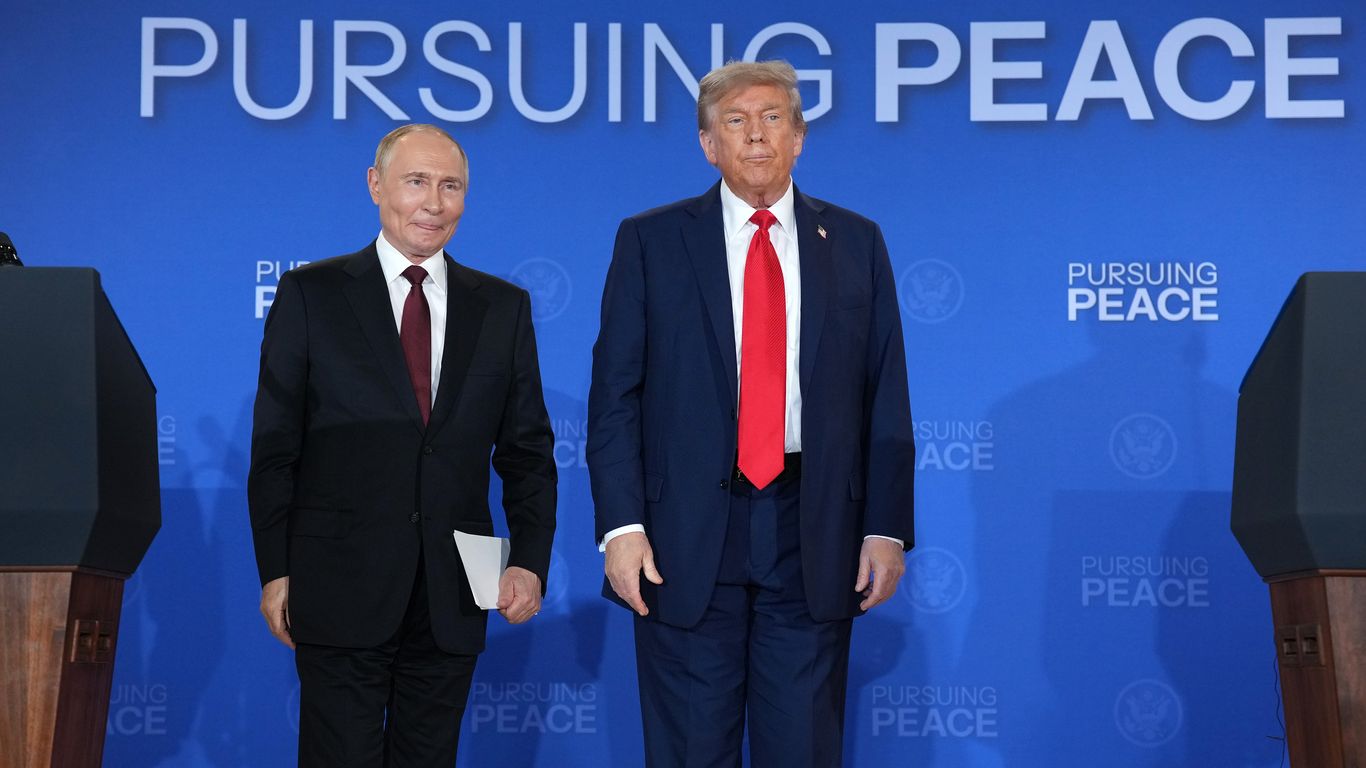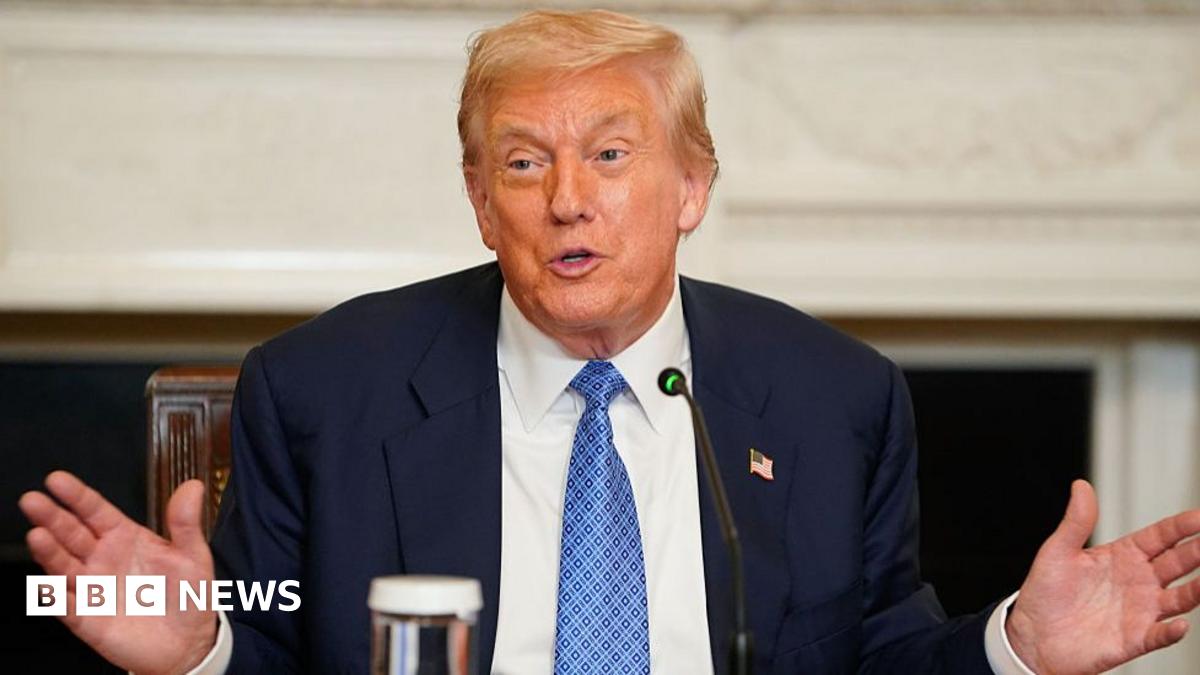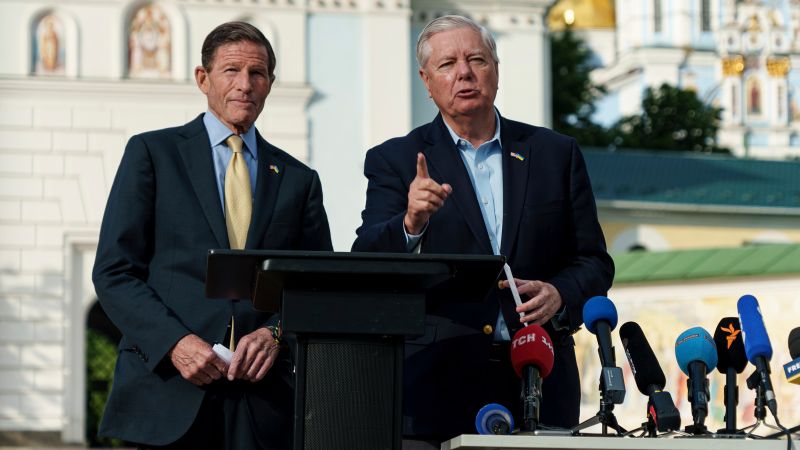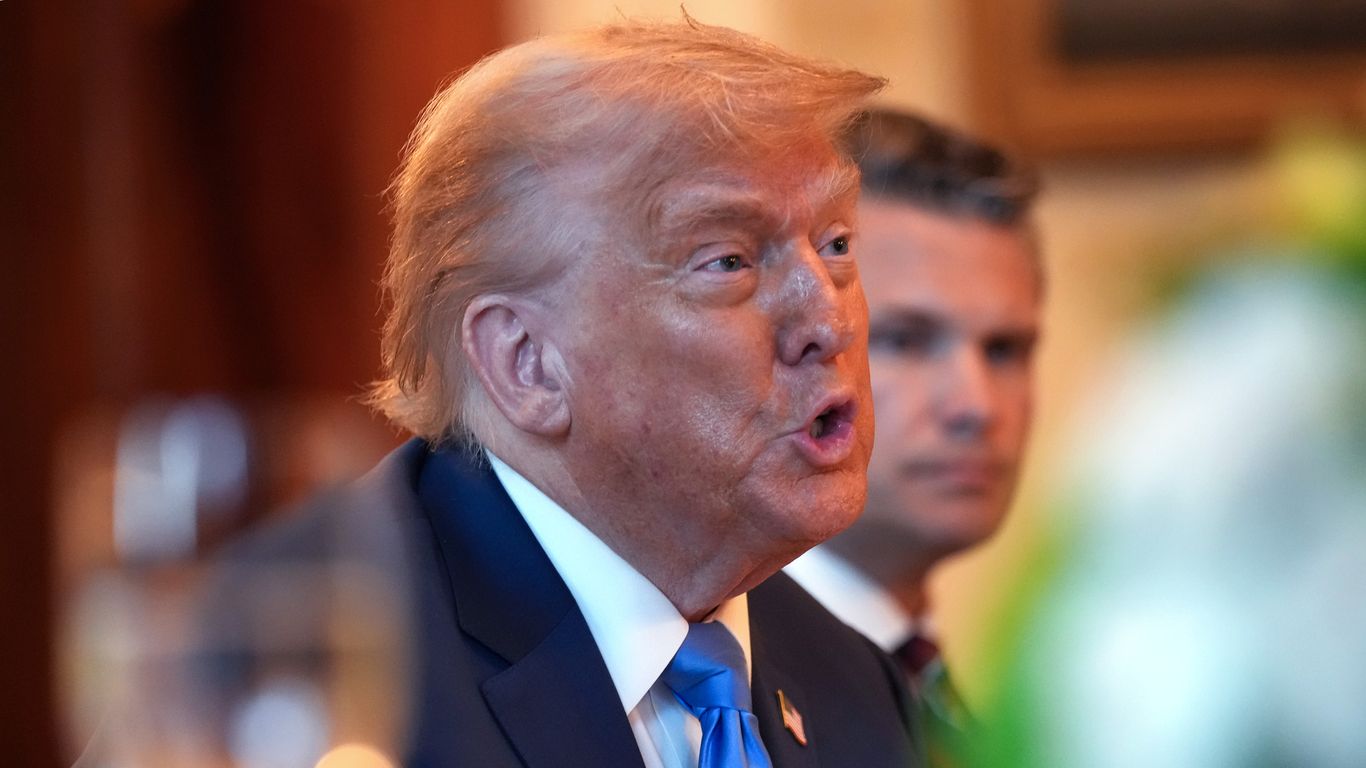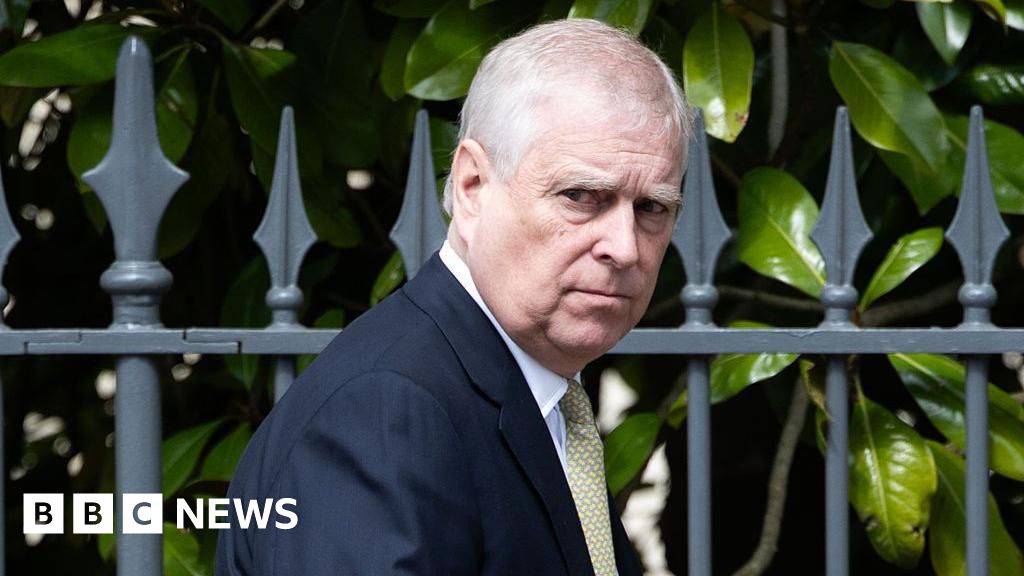Russia's President Putin Outplays US President Trump in Recent Meeting

Introduction
Russia's President Vladimir Putin has once again shown his prowess in the international political arena by outplaying US President Donald Trump in their recent meeting in Anchorage, Alaska. Despite the US's tough stance on Russia's aggression in Ukraine, Putin managed to draw Trump closer to Moscow's position on the ongoing war in the region.
Key Details
The meeting between the two leaders was highly anticipated, as it was their first in-person encounter since Biden took office. While Trump's administration had imposed numerous sanctions on Russia for its annexation of Crimea and involvement in the ongoing war in Ukraine, Putin seemed to have the upper hand in the discussions. He refused to make any concessions and showed no signs of agreeing to a ceasefire, despite Trump's attempts to negotiate.
Moreover, Putin highlighted the importance of maintaining Russia's presence in the Black Sea region and protecting the rights of ethnic Russians in Ukraine. He also raised concerns about the US's involvement in Ukraine's internal affairs and accused the country of interfering in the conflict.
Impact
This meeting has significant implications for the ongoing war in Ukraine and the relationship between the US and Russia. With Trump seemingly aligning more with Putin's position, it could potentially undermine the efforts of the US and its allies to put pressure on Russia to end its aggression and human rights violations in the region. It is also a clear
About the People Mentioned
Vladimir Putin
Vladimir Putin is the current President of Russia, a position he has held for multiple terms since 2000, with a brief interlude as Prime Minister from 2008 to 2012[1][3]. Born in Leningrad (now Saint Petersburg) in 1952, Putin began his career in the Soviet Union’s security services, joining the KGB in 1975 and rising to the rank of Lieutenant Colonel by the time he left in 1991, following postings in East Germany and Leningrad[4]. After the Soviet Union’s collapse, he transitioned into politics, serving as an adviser to Saint Petersburg Mayor Anatoly Sobchak and later moving to Moscow, where he held various administrative roles under President Boris Yeltsin[6]. Putin was appointed Prime Minister in August 1999 and became acting President when Yeltsin unexpectedly resigned that December[3][6]. He won his first presidential election in March 2000, promising to stabilize Russia’s economy and political system after the tumultuous 1990s[3][7]. During his initial terms, he centralized power, reasserted federal control over Russia’s regions, and curtailed the influence of the country’s oligarchs through legal and economic measures[7]. Putin was re-elected in 2004 but, due to constitutional term limits, stepped aside in 2008, becoming Prime Minister under his successor Dmitry Medvedev, while retaining significant influence[3]. Constitutional amendments later extended presidential terms, and Putin returned to the presidency in 2012[1]. Putin’s time in office has been marked by assertive foreign policy, including military interventions in Syria in support of President Bashar al-Assad and the 2014 annexation of Crimea, which led to international sanctions[1]. Domestically, his tenure has seen increased state control over media, the suppression of political opposition, and constitutional changes consolidating executive authority[1]. In 2022, Russia’s full-scale invasion of Ukraine triggered a major international crisis, further isolating Russia from the West and prompting widespread condemnation[1]. As of 2025, Putin remains a dominant figure in Russian politics, having secured another term in office through constitutional changes that allow him to potentially remain president until 2036[1]. His leadership continues to shape Russia’s domestic trajectory and its role in global affairs, amid ongoing conflict in Ukraine and strained relations with NATO and Western countries[1].
Donald Trump
Donald John Trump, born June 14, 1946, in Queens, New York, is an American businessman, media personality, and politician. He graduated from the University of Pennsylvania’s Wharton School in 1968 with a degree in economics. In 1971, he took over his family’s real estate business, renaming it the Trump Organization, through which he expanded into building and managing skyscrapers, hotels, casinos, and golf courses. Trump gained widespread fame as the host of the reality TV show *The Apprentice* from 2004 to 2015, which helped establish his public persona as a successful entrepreneur. Trump entered politics as a Republican and was elected the 45th president of the United States, serving from 2017 to 2021. His presidency was marked by significant policy actions including tax cuts, deregulation, the appointment of three Supreme Court justices, renegotiation of trade agreements (notably replacing NAFTA with the USMCA), and a focus on immigration control including border wall expansion. He withdrew the U.S. from international agreements such as the Paris Climate Accord and the Iran nuclear deal, and engaged in a trade war with China. His administration’s response to the COVID-19 pandemic was criticized for downplaying the virus’s severity. Trump was impeached twice by the House of Representatives—first in 2019 for abuse of power and obstruction, and again in 2021 for incitement of insurrection—but was acquitted by the Senate both times. After losing the 2020 election to Joe Biden, Trump challenged the results, culminating in the January 6, 2021, Capitol riot. He remains a central figure in American politics, having won the 2024 presidential election and returned as the 47th president in 2025, continuing to promote policies aimed at economic growth, border security, and military strength[1][2][3][4].
Joe Biden
Joseph Robinette Biden Jr., commonly known as Joe Biden, is the 46th President of the United States, serving from 2021 to 2025. Born on November 20, 1942, in Scranton, Pennsylvania, Biden moved to Delaware with his family in 1953. He graduated from the University of Delaware in 1965 and Syracuse University Law School in 1968. Before entering national politics, Biden served on the New Castle County Council and later became one of the youngest U.S. Senators at the age of 29, representing Delaware from 1973 to 2009. During his Senate career, Biden chaired the Senate Judiciary Committee and Foreign Relations Committee. He played a crucial role in drafting several significant pieces of legislation, including the Violence Against Women Act and the Violent Crime Control and Law Enforcement Act. Biden also oversaw several U.S. Supreme Court confirmation hearings. In 2008, he was chosen by Barack Obama as his vice presidential running mate, serving two terms as the 47th Vice President of the United States. In 2020, Biden won the presidential election, defeating incumbent President Donald Trump. As President, he focused on rebuilding America's international leadership and implementing policies to address economic recovery and social issues. Biden's presidency concluded on January 20, 2025, when Donald Trump returned to office. Recently, Biden announced that he had been diagnosed with Stage 4 prostate cancer. Despite his health challenges, Biden remains a figure of national interest, with ongoing discussions about his political legacy and influence. His dedication to public service and his efforts to expand opportunities for Americans have been central themes throughout his career.
About the Organizations Mentioned
US
The query seems to be about providing a summary of the organization "US," which could be interpreted as the United States government or a specific entity within it. However, without a clear reference to an "organization" named "US," I will provide a comprehensive overview of the United States government, focusing on its structure, history, achievements, current status, and notable aspects relevant to business and technology. ## Overview of the United States Government The United States government is a federal republic with a system divided into three branches: the legislative, executive, and judicial. This structure is designed to provide checks and balances on each branch. ## History The U.S. government was established in 1789 under the Constitution, which outlines the framework of the federal system. Over time, the government has evolved through numerous amendments and reforms, shaping policies and laws that impact various sectors, including business and technology. ## Key Achievements - **Economic Growth**: The U.S. has been a global leader in economic growth, innovation, and technological advancements, fostering a strong business environment. - **Technological Advancements**: The government has supported significant technological developments, such as the internet and space exploration, through funding and regulatory frameworks. - **Regulatory Frameworks**: Agencies like the Federal Trade Commission (FTC) and the Federal Communications Commission (FCC) play crucial roles in regulating industries and ensuring consumer protection. ## Current Status Currently, the U.S. government is engaged in various initiatives to address contemporary challenges such as climate change, cybersecurity, and healthcare reform. The government also continues to evolve its organizational structure, with ongoing discussions about the role of the executive branch, as seen in initiatives like Project 2025. ## Notable Aspects - **Project 2025**: This initiative, backed by the Heritage Foundation, aims to restructure the federal government to align with conservative ideals, potentially impacting civil rights and executive branch powers. - **Standards and Regulations**: The U.S. Standards Strategy,
Black Sea
The **Organization of the Black Sea Economic Cooperation (BSEC)** is a multilateral intergovernmental organization established in 1992 with the primary goal of promoting economic collaboration, peace, stability, and prosperity in the wider Black Sea region. It includes 12 member states: Albania, Armenia, Azerbaijan, Bulgaria, Georgia, Greece, Moldova, Romania, Russia, Serbia, Turkey, and Ukraine, encompassing a strategically vital zone bridging Europe and Asia[1][2][3]. BSEC was founded at the Istanbul Summit on June 25, 1992, and its Permanent International Secretariat (PERMIS) is based in Istanbul. The organization’s structure features a Council of Ministers for Foreign Affairs as its central decision-making body, which meets biannually. It also has a Parliamentary Assembly (PABSEC) providing consultative support, a Business Council fostering public-private cooperation, and the Black Sea Trade and Development Bank (BSTDB), which finances regional projects with support from institutions like the European Investment Bank and the European Bank for Reconstruction and Development[2][3][4]. BSEC’s activities span a wide range of economic and social sectors including transport and communication infrastructure, trade, agriculture, banking and finance, environment, tourism, culture, and education. It facilitates information exchange and joint initiatives on counterterrorism, scientific research, and legislative harmonization among member states. The organization also actively cooperates with international partners such as the UN, EU, and various regional associations to enhance regional integration and development[1][4][5][6]. Over its more than 30 years of existence, BSEC has become the oldest and most representative regional economic organization in the Black Sea area, successfully managing complex geopolitical sensitivities among member states with diverse affiliations (EU, Eurasian Economic Union, and others). It plays a crucial role as a geostrategic hub for energy, transport, and trade routes connecting Europe and Asia, contributing significantly to regional stability and economic growth[
Crimea
The term "Crimea" in your query appears to refer to the geopolitical region rather than an organization. However, there is no widely known organization named "Crimea." Instead, Crimea is a peninsula with significant political, economic, and technological importance, especially in the context of recent geopolitical events. Crimea is a peninsula on the northern coast of the Black Sea, historically part of Ukraine but annexed by Russia in 2014. This annexation triggered major changes in the region’s infrastructure, economy, and international relations. Following the annexation, Crimea's internet and telecommunications infrastructure were transitioned from Ukrainian to Russian control through a gradual "soft substitution" process lasting about three years, involving takeover by Russian-backed entities like Krymtelekom[1]. Economically, Crimea has a modest industrial base with sectors including agriculture, fishing, manufacturing, and tourism. Before 2014, tourism was a significant contributor, with over 6 million visitors in 2012, but the sector suffered after the annexation due to international sanctions and geopolitical tensions, dropping to 3.8 million visitors in 2014 before partially recovering[4]. The industry includes food production, chemicals, mechanical engineering, and fuel production, but the region remains relatively poor compared to Russia as a whole[4][6]. International sanctions imposed by the EU and others prohibit exports of goods, technology, and services in key sectors like telecommunications, energy, and infrastructure to Crimea, complicating business operations and investments in the region[2]. Despite this, there are signs of international business interest in Crimea's future post-conflict reintegration, with Ukrainian and international companies expressing readiness to invest once de-occupation occurs[3][8]. A notable technological and logistical asset is the Kerch Bridge, connecting Crimea to Russia, vital for transport and military supplies. Its strategic importance was highlighted during recent conflicts, with attacks on the bridge impacting Russian logistics[7]. In summary, Crimea is a geopolitically sensitive region with evolvin
